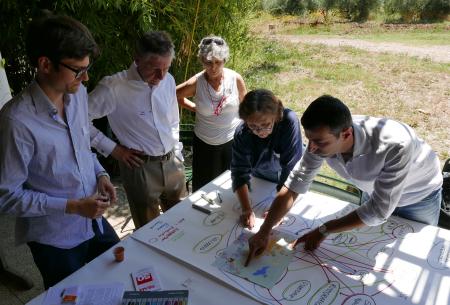
Resource description:
Methodology for formulating a shared local vision using a systematic "transversal approach".
Author/Contact:
TURAS
Expert contact: Stephan Kampelmann
Requirements:
- Any local authority department linked to space, community or economy development (green spaces, agriculture, waste management, water management, economic department, etc). In one example, the authorities of two large universities were assisted by members
Advantages:
- The complexity of many projects requires bringing together knowledge on the different dimensions. The planning process is divided into seven phases: 1 - Inception. 2 - Research. 3 - Framing. 4 - Exploration. 5 - Dialogue. 6 - Documentation. 7 - Implementa
- After an initial RESEARCH phase, we disentangle the development and FRAME them in distinct themes that are connected to initial hypotheses about the future. For instance, for the Cité Internationale Universitaire project in Brussels, we defined four them
- The outcome of transversal planning is a programme that is co-created with a much larger constituency of experts and stakeholders compared to conventional interventions. In the DOCUMENTATION, the output of this co-creation is condensed in a meaningful nar
Constraints:
- Local economic development plans are traditionally built on compartmentalised actions. While urban planners and real estate developers shape the physical basis of the economy, economic stimulation agencies and administrations responsible for training and
Uses of this resource:
Building a sustainable and resilient economy is about connecting places, communities, and economic activities. Moving from a compartmentalised to a concerted approach is, however, a big challenge: without an effective approach to envisioning the complex interactions between places, communities and the economy it is very difficult to make any progress in the way of transition.
Additional information:
Who should be involved?
The following expertise is required to apply the curatorial planning methodology: animation of participatory processes, facilitation of system thinking, complexity management, animation of multi-stakeholder workshops, knowledge brokering between different types of stakeholders and areas of expertise, the capacity to synthesise complex information into accessible and communicable formats.
FACILITATORY (PUBLIC) BODIES:
community development department; water and sewerage management department; energy and waste department; socio-economic development department; agriculture department; green spaces department; planning and development department
LOCAL TASK FORCE:
professional expert; community group; researcher; local or regional authority; business; entrepreneur
SUITABLE FOR:
underused urban site & building; (sub-) urban communities; urban-rural interface; urban region
MAIN NECESSARY RESOURCES ARE:
community trust; local knowledge; expert knowledge; public institutional set-up
Licence:
- Free, no licence
Development stage:
- Full, working product